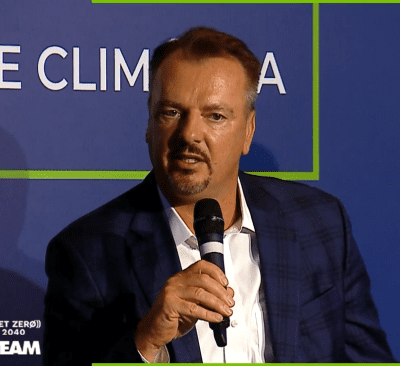
ENVIRONMENTAL sustainability has become all the rage in the past year, as the beef industry aims to work out how it fits into ambitious targets set by governments and companies.
While the push to reduce emissions and sequester carbon is well underway in Australia and other countries, there still seems to be plenty of public discussion encouraging consumers to eat less meat.
The issue created plenty of discussion at an international forum held by JBS earlier this month – with a panel of scientists and commentators asked if there should be a global beef industry fund to research livestock emissions.

Diana Rodgers
While the majority on panel, including Diana Rodgers, who is a US dietician director of the Sacred Cow documentary, agreed such a fund would be beneficial, they also said perspective was needed when it came to managing emissions.
“Although is important to reduce emissions, it is a bit of a strawman and reductionist argument for everyone in the beef industry to be so focused on it,” Ms Rodgers said.
“I think the meat industry tends to be very reactive and it could be more proactive in showing the really great stories attached to it – like the story of leather and soap. Also, it needs to point out that the fake meat industry is completely greenwashing people.”
Ms Rodgers’ comments were made after the subject was addressed by Professor Peer Ederer from European livestock science organisation, GAOL Sciences. Professor Ederer said reducing emissions should come with the co-benefit of increasing production.
“There are many good reasons to reduce methane emissions, methane is a loss of energy in the animal– so if we can reduce methane inside the animal we make the animal more productive,” he said.
“As long as we don’t fully understand what is happening in the atmosphere, we should reduce methane as a precaution. But only if we can do it as a ‘no regret’ move, where there are production benefits.”
Do consumers believe the science?
The question was also put to University of California professor Frank Mitloehner, who addressed the conference about the opportunities created by methane.

Dr Frank Mitloehner
Dr Mitloehner said while reducing methane to increase production was important, not everyone would agree with the strategy.
“In Europe, the US and other places people are very strong in promoting methane as a leading cause of climate change,” Dr Mitloehner said.
“In animal agriculture we need to think about the narrative we choose to use in these discussions.”
Dr Mitloehner said the beef industry needed to take some responsibility with emissions.
“In my opinion the narrative that resonates the most is to say ‘we’re not the main contributor but we are a contributor of greenhouse gases, methane is our main gas, we know how much we emit and we should have reduction goals’,” he said.
“If we pursue reduction goals aggressively we will be part of a societal discussion about greenhouse gases, which is different to the past. In the past we have been talking more about how we don’t believe in it and has not taken us anywhere.”
Who is behind the anti-meat agenda?
Another popular question put the panel was about who were of the main forces behind anti-meat messaging across the world.
Professor Ederer said he was able to break it down to three different categories after a trip the United Nations’ United Food Systems Summit last year.

Professor Peer Ederer
“One of them was very rich individuals, who have nothing else to do and they want to force the world to adopt their views of life,” he said.
“Another group was large global consumer goods companies who have a lot to gain from highly processed food, rather than farmer-generated handmade food.”
“There also seems to be a lot of Silicon Valley money driving this and I haven’t understood why Silicon Valley money is driving that”
Dr Mitloehner said there was also groups of animal activists across the world who have combined over the years.
“Many of the anti-livestock groups started with activists who have ethical concerns about any consumption of animal-sourced foods. They say ‘we should not ever kill animals and eat them’,” he said.
“There are many of these groups who worked together and they have established lobby groups that now lobby for plant-based alternatives being promoted and policies made to support them.”
“It seems to the public as if they are representing them at large, but they are a relatively small group who are so loud that the public thinks they represent the general population – which is not true. They do ask questions though and we in the agricultural industry need to do a better job of explaining our story because we have been terrible at that.”

We continue to be led by minorities, and this is costing us money that could be better spent, here anyway, on validating what Dr Bill Burrows believes is the emissions situation in Australia. If we in fact are a ‘net zero CO2-e emitter’ why waste our time, and money, on reductions that are not required internationally by us?
So why not look for the less expensive answers first, before heading head first into agreeing with the scaremongering minorities who seek to ‘change’ the ‘changes’ which are already ‘changing’ naturally in climate ‘change’?
I am but a mere human being, and by nature we hate ‘change’!!
Seems to me that the minorities thrive on promoting ‘change’, though I also note that they only do so, as long as it only affects others than themselves!!